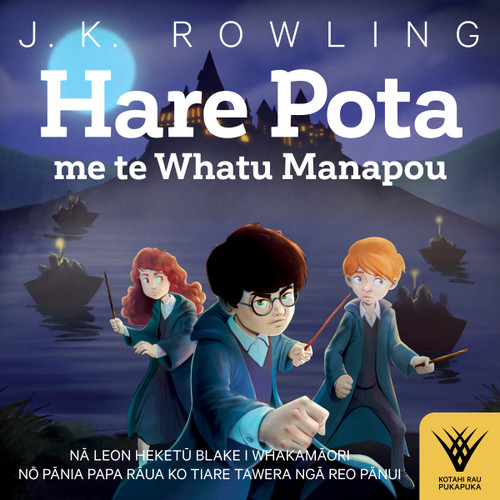
Te Koroua me te Moana
Ernest Hemingway
He tuhinga rongonui nā Hemingway e pā ana ki tētahi koroua, ki tētahi tama me tētahi ika kaitā – kua whakamāoritia.
Kei ngā hihi pūkākā o te rā, kei tētahi kāinga pakupaku i te takutai o Hawāna tētahi koroua hī ika e noho ana, ko Hanatīako tōna ingoa. Kua waru tekau mā whā rā te roa kāore i mau i a ia he ika. E mea ana te iwi o reira he kirihaunga. I runga i tōna manawa kai roke, ka haere takitahi atu a Hanatīako i runga i tōna poti iti ka hī ika ai ki tua atu o ngā taunga ika i haere ai ia i mua. I roto i te roa o ngā rā, ka whakamātautauria rawatia tōna manawa ū me tōna mārohirohi.
I toa i te tuhinga poto nei nā Hemingway te taonga Pulitzer Prize i te wāhanga Pakimaero, ā, nā tēnei i hua mai ai tana toanga Nobel Prize i te tau 1954 i te wāhanga Mātātuhi. Ko Te Koroua me te Moana tētahi tuhinga nā te ringa rehe i waihanga, he tirohanga motuhake hoki ki tā te tangata kotahi whakapātaritari i ngā mana o te ao.
________
Hemingway’s classic story of an old man, a young boy and a giant fish – now translated into te reo Māori.
In the baking sun, in a small village off the coast of Havana, lives an old fisherman named Santiago. It has been eighty-four days since he last caught a fish. The locals call it bad luck. Refusing to accept defeat, Santiago sets off in his tiny skiff alone, fishing further out than ever before. Over a number of days his will and his character are tested beyond imagination.
Hemingway’s classic short novel won the Pulitzer Prize for Fiction and directly led to his Nobel Prize in Literature in 1954. The Old Man and the Sea is a perfectly crafted story and a unique vision of one man’s challenge to the elements.
Te Kaituhi / Author
Ko Ernest Hemingway (1899–1961) he kairīpoata, he kaituhi pukapuka, he kaituhi tuhinga poto, he tangata hākinakina hoki nō Amerika. Ko tana taera tuhituhi he kupu ruarua, he tautika, kua whakaaweawe hoki i ngā tuhinga pakimaero o te rautau rua tekau nei, ā, e whakapaea ana ko ngā pukapuka pēnei i a Te Koroua me te Moana me Te Hunga i Tangi ai ngā Pere he tino taonga i te ao Mātātuhi Amerikana. Nā te kaituhi nei, nā Richard Ford te kōrero ko Fitzgerald rātou ko Hemingway ko Faulkner ‘ngā Kīngi Tokotoru nā rātou te taumata tiketike i whakatauira mō ngā kaituhi haere ake nei.’
I tino aroha a Hemingway ki a Kūpa, i reira tētahi kāinga ōna, i reira hoki i waiho ai e ia tana mētara Nobel Prize kia tiakina ai e te Hāhi Katorika, hei painga hoki mō ngā iwi o reira.
________
Ernest Hemingway (1899–1961) was an American journalist, novelist, short-story writer and sportsman. His economical and understated style has had a strong influence on twentieth-century fiction, and books such as Old Man and the Sea and For Whom the Bell Tolls are considered classics of American literature. Writer Richard Ford calls Fitzgerald, Hemingway and Faulkner ‘the Three Kings who set the measure for every writer since’. Hemingway loved Cuba, where he had a home, and where he placed his Nobel Prize medal in the custody of the Catholic Church for the benefit of the local people.
Te Kaiwhakamāori / Translator
E ara Tānetehiringa kia tōia ake rā ko te ao mārama ki runga Hikurangi.
E ara Te Manu-nui-a-Tāne kia whitikina iho ko te iwi nāna te kaiwhakamāori nei i homai.
E ara Tamanuiterā kia mahuta mai ki runga i ana hapū, i a Te Whānau a Tapuhi, i a Te Whānau a Te Aopare.
Ko Hikurangi maunga, ko Waiapu awa, ko Ngāti Porou iwi ka noi ki te rangi ē.
Nō te tuawaru o Āpereira nō te tau 1988 a Greg Koia whānau mai ai i Tūranganui-a-Kiwa. He mea whāngai a ia e tana kuia, e Ema Te Matemihikore Koia rāua ko tana koroua, ko Hēmi Tuapawa.
Mai i te tau 2007 ki te tau 2014 ka noho a Greg ki te Whare Wānanga o Waikato. Nōna i reira ka whakawhiwhia ki te Tohu Paetahi, ki te Tohu Paerua, ki te Tohu Kaiako anō hoki. He Ika-a-Whiro a Greg nō Te Panekiretanga o te Reo.
Ko te 2007 te tau i tū tuatahi ai a Greg i te kapa haka o Te Pou o Mangatāwhiri. Ko te tito mōteatea te mahi rata katoa ki a ia. E hia kē nei ngā waiata me ngā haka kua titoa e Greg i Te Matatini, i te Whakataetae-ā-rohe o Tainui anō hoki.
Ā kāti, he parapara i heke mai i ōna kaumātua, i ōna kaukuia o te Tai Rāwhiti. Waiho mā ana mahi ōna pūkenga, tōna koi e kōrero.
________
Rise Tānetehiringa and bring forth the light upon the mountain, Hikurangi. Rise Te Manu-a-Tāne and shine light upon the tribe who gave us the translator of this work. Rise Tamanuiterā above his subtribes, Te Whānau a Tapuhi and Te Whānau a Te Aopare. Let us celebrate his mountain, Hikurangi, his river, Waiapu and his iwi Ngāti Porou.
On the 8th of April 1988 Greg Koia was born in his hometown, in Gisborne. He was raised by his grandmother, Ema Te Matemihikore Koia and his grandfather Hēmi Tuapawa. From 2007 to 2014 he studied and worked at the University of Waikato. During his time there he was awarded a Bachelor of Arts, Master of Arts and Postgraduate Diploma in Teaching. Greg is also an alumni of Te Panekiretanga o te Reo (The Institute of Excellence in the Māori Language).
2007 was the year Greg first stood with the haka group, Te Pou o Mangatāwhiri. Composition of traditional Māori song is what he enjoys doing most. He has composed an abundance of song for both Te Matatini and the Tainui Regional competitions.
Greg is a product of his ancestors of Te Tai Rāwhiti and his work reflects his skills and wit.




![Te Ruānuku. Kotahi Rau Pukapuka 3 [The Alchemist]. Paulo Coelho. Nā Hēmi Kelly i whakamāori](https://cdn11.bigcommerce.com/s-qvcg41qdf5/images/stencil/500x800/products/2484/3171/9781869409258__81125.1600378113.jpg?c=2)